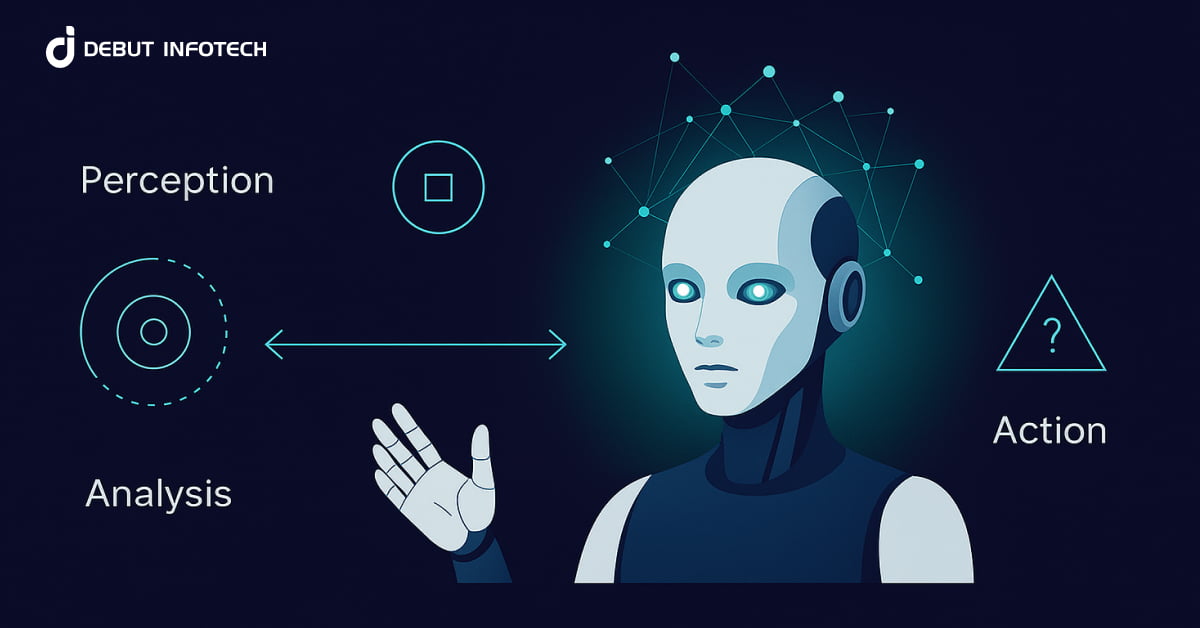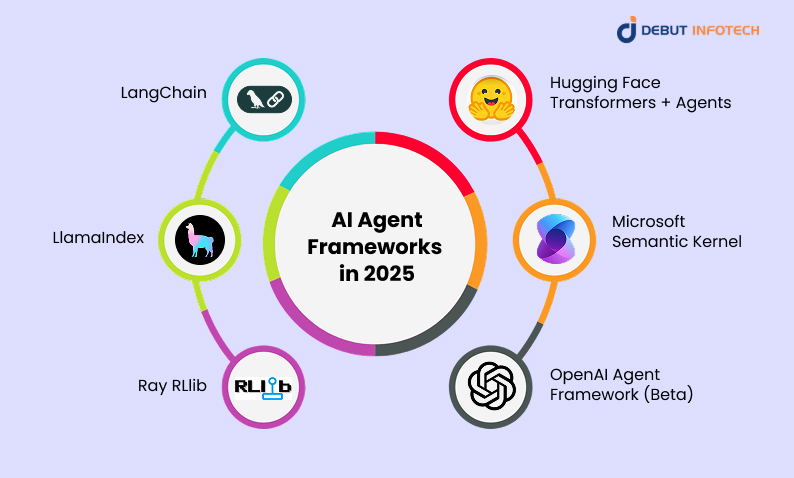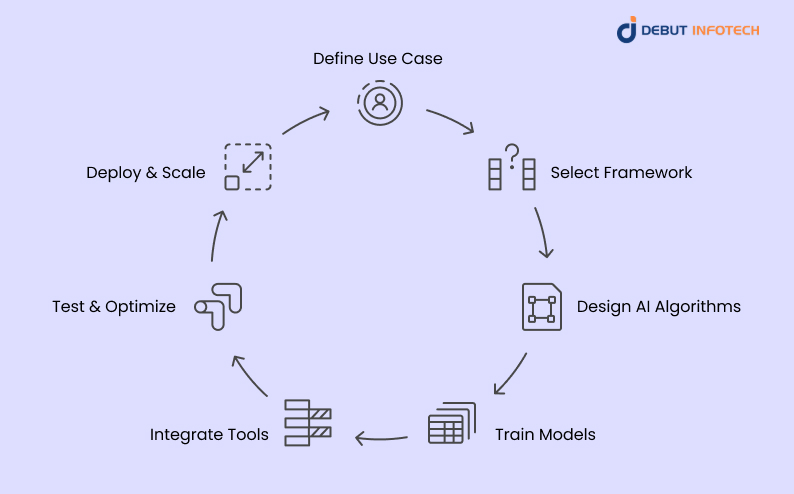Table of Contents
Home / Blog / Artificial Intelligence
Emerging Frameworks for AI Agent Development 2025 Complete Guide
September 2, 2025

September 2, 2025
Chatbots and predictive analytics are just two examples of how artificial intelligence (AI) has advanced. Businesses aim to create AI agents, self-governing, intelligent machines that can solve issues, make decisions, and communicate with people naturally. These agents influence the next wave of innovation, from virtual assistants that manage enterprise workflows to AI Copilots that help with coding. AI agent development frameworks, which offer the organization resources and algorithms required to successfully create, train, and implement intelligent agents, are the foundation of this evolution.
Businesses investigating the creation of AI agents are currently assessing which frameworks will best complement their long-term plans. This guide examines the new AI agent frameworks’ flexibility, scalability, and affordability in 2025. It discusses AI development services, tools, and algorithms, offering useful advice to help startups and businesses select the best option.
Build Smarter AI Agents Today
From concept to deployment, our experts simplify AI agent development and deliver results that matter.
What is an AI Agent Framework?
An AI agent framework is a structured set of tools, libraries, and methodologies designed to streamline the development of AI agents. Think of it as the blueprint for building intelligent systems that can process information, learn from data, and act autonomously in real-world environments.
Key functions of AI agent frameworks include:
- Environment simulation allowing developers to train and test agents.
- Integration with AI models such as large language models (LLMs) or reinforcement learning models.
- Built-in AI algorithms for decision-making, reasoning, and planning.
- Scalability features to handle enterprise-level deployment.
With frameworks, companies gain a structured foundation that reduces AI development cost while improving time-to-market.
Why AI Agent Development Matters in 2025
The push toward automation and intelligent decision-making has made AI agent development services a top priority for enterprises. Unlike traditional applications, AI agents are designed to:
- Operate autonomously without constant human intervention.
- Adapt to changing conditions through machine learning.
- Enhance productivity by acting as AI Copilots in specialized workflows (e.g., coding, legal research, healthcare diagnosis).
- Provide contextual responses by integrating multiple AI models simultaneously.
For businesses, the value lies in creating competitive differentiation, reducing operational bottlenecks, and introducing scalable automation. No wonder AI Agent Development Companies and AI consulting services are seeing surging demand in 2025.
Key AI Trends Shaping Agent Development
The future of AI agents is influenced by several trends that define how frameworks are evolving:
- Multi-Model Integration: Agents are no longer tied to one AI model; they combine natural language processing, vision, and reasoning models.
- AI Copilot Ecosystems: Specialized copilots for law, healthcare, finance, and education are rising.
- Explainable AI Algorithms: Transparency is critical as businesses demand to understand how decisions are made.
- Cloud-Native AI Development: Frameworks are optimized for deployment across AWS, Azure, and Google Cloud.
- Low-Code AI Tools: Empowering non-technical users to create agents with minimal coding.
- Edge AI: Agents operating in IoT and real-time environments where cloud processing isn’t viable.
These AI trends guide both developers and decision-makers when choosing an AI agent development framework.
Related Read: Impact of AI Agents in Automotive Applications
Leading AI Agent Frameworks in 2025

AI agent development is accelerating in 2025, with new frameworks emerging to help developers build smarter, more efficient, and business-ready agents. Each framework comes with unique strengths, integrations, and target use cases. To help you evaluate the options, here’s an expanded AI agent frameworks comparison with details on the leading platforms shaping the future of AI agents.
1. LangChain
Overview: LangChain has become one of the most widely adopted AI agent frameworks for developers building with large language models (LLMs). It seamlessly orchestrates multiple models, APIs, and tools into one cohesive system.
Strengths:
- Rapid prototyping with modular components.
- Rich ecosystem of integrations with databases, APIs, and vector stores.
- Large, active community providing tutorials, open-source contributions, and plug-ins.
Best For: AI Copilots, customer-facing chatbots, workflow automation tools, and multi-step reasoning agents. Developers looking for speed and flexibility in AI agent development often choose LangChain.
2. LlamaIndex
Overview: LlamaIndex focuses on knowledge-based AI agent development, making it easier for agents to retrieve, process, and reason over structured and unstructured data.
Strengths:
- Efficient data indexing and retrieval from diverse sources.
- Strong compatibility with enterprise datasets such as SQL, NoSQL, and proprietary knowledge bases.
- Excellent for context-rich applications requiring accuracy and transparency.
Best For: Research assistants, enterprise knowledge agents, and data-heavy applications where retrieving accurate information is critical.
3. Ray RLlib
Overview: Ray RLlib is a reinforcement learning (RL) framework designed for building AI agents that learn by interacting with environments. It is highly scalable and used in complex domains.
Strengths:
- Distributed training for large-scale RL experiments.
- Robust support for simulations and real-time environments.
- Integrates with multiple AI models and cloud backends.
Best For: Robotics, self-learning AI agents, gaming simulations, and industrial automation where agents must adapt dynamically.
4. Hugging Face Transformers + Agents
Overview: Hugging Face combines its extensive library of pretrained models with new agent-oriented capabilities, enabling developers to build custom AI agents quickly.
Strengths:
- Access to thousands of open-source AI models across NLP, vision, and multimodal tasks.
- Strong open-source community with fast updates and innovation.
- Flexible customization for AI development services.
Best For: Experimentation, proof-of-concept projects, startups, and companies looking to leverage open-source AI tools without heavy licensing costs.
5. Microsoft Semantic Kernel
Overview: Semantic Kernel is a framework designed to bring LLM capabilities directly into enterprise applications and business workflows.
Strengths:
- Deep integration with Microsoft’s ecosystem (Azure, Power Platform, Office tools).
- Support for multiple cloud platforms, giving businesses flexibility.
- Built-in compliance and enterprise-grade scalability.
Best For: Enterprises needing AI agents embedded into business workflows, with a strong focus on governance, compliance, and hybrid cloud support.
6. OpenAI Agent Framework (Beta)
Overview: Introduced in 2025, the OpenAI Agent Framework is still in beta but already gaining traction. It leverages GPT-based models to create advanced, autonomous AI agents.
Strengths:
- State-of-the-art natural language understanding and reasoning.
- Developer-friendly APIs designed for smooth integration.
- Strong alignment with cutting-edge conversational AI trends.
Best For: Businesses seeking cutting-edge conversational agents, autonomous copilots, and enterprise-grade AI assistants that feel highly natural in interaction.
AI Agent Frameworks Comparison Table
| Framework | Best Use Case | Key Strengths | Ideal Users |
| LangChain | AI Copilots & chatbots | Prototyping, integrations | Startups, enterprises |
| LlamaIndex | Knowledge retrieval agents | Data indexing, retrieval | Research-driven firms |
| Ray RLlib | Robotics & reinforcement | Distributed training | AI Agents Companies |
| Hugging Face Agents | Experimentation | Wide model access | AI development companies |
| Semantic Kernel | Workflow automation | Enterprise-grade, cloud support | Large enterprises |
| OpenAI Agents | Conversational assistants | Advanced language models | Innovative businesses |
Choosing the Best AI Agent Framework
When businesses ask, “What is the best AI agent framework?” the answer depends on their needs. An enterprise requiring compliance-ready, scalable AI agent development services might lean toward Semantic Kernel or OpenAI’s agent framework.
Integration Needs: Your AI agent must seamlessly fit into your existing ecosystem of tools, APIs, databases, and workflows. A framework that offers plug-and-play integrations will save significant time and cost compared to one that requires heavy customization.
Scalability: An AI agent that works for a pilot project may fail when expanded to thousands of users. Ensure the framework supports distributed systems, cloud deployment, and real-time performance monitoring.
AI Algorithms Required: Different use cases demand different models. Reinforcement learning suits robotics and simulations, while LLM orchestration powers chatbots and copilots. Some frameworks excel in niche areas, while others provide flexibility across multiple approaches.
Budget and ROI: Cost is always a consideration. Businesses must weigh whether they need rapid deployment with minimal upfront expense, or a robust, sustainable solution that may require higher investment but offers greater long-term value.
Security & Compliance: Enterprises in finance and healthcare must ensure that the chosen framework adheres to strict data privacy and compliance standards. Look for features like encryption, audit trails, and regulatory certifications.
Community & Support: A strong developer ecosystem and active support network make a big difference. Frameworks backed by vibrant communities and reliable documentation speed up troubleshooting and innovation.
How to Build an AI Agent: A Step-by-Step Approach

Building an AI agent is a multi-layered process requiring technical expertise and strategic planning. By following a structured approach, businesses can reduce risks, ensure scalability, and achieve measurable results. Below is a step-by-step outline for AI agent development.
1. Define Use Case
Every successful AI project starts with a clear problem statement. Determine what business challenge the AI agent will address—whether it’s customer support automation, workflow optimization, predictive analytics, or an AI Copilot. Defining the goals upfront ensures that the agent is designed with purpose and measurable outcomes.
Every successful AI project starts with a clear problem statement. Determine what business challenge the AI agent will address—whether it’s customer support automation, workflow optimization, predictive analytics, or an AI Copilot. Defining the goals upfront ensures that the agent is designed with purpose and measurable outcomes.
2. Select Framework
Choosing the right framework is crucial. AI agent frameworks like LangChain, LlamaIndex, Hugging Face, or Microsoft Semantic Kernel each offer unique strengths. The choice depends on your needs: workflow orchestration, data-heavy applications, reinforcement learning, or enterprise-grade compliance. Conducting an AI agent frameworks comparison helps narrow down the most suitable option.
Choosing the right framework is crucial. AI agent frameworks like LangChain, LlamaIndex, Hugging Face, or Microsoft Semantic Kernel each offer unique strengths. The choice depends on your needs: workflow orchestration, data-heavy applications, reinforcement learning, or enterprise-grade compliance. Conducting an AI agent frameworks comparison helps narrow down the most suitable option.
3. Design AI Algorithms
Next, decide on the AI algorithms and models the agent will use. For example:
Next, decide on the AI algorithms and models the agent will use. For example:
- Supervised learning for tasks like classification or prediction.
- Unsupervised learning for clustering or anomaly detection.
- Reinforcement learning for adaptive systems such as robotics or gaming.
The right combination ensures the agent learns efficiently and adapts to dynamic environments.
4. Train Models
Training is where AI agents learn to act intelligently. Training may involve enterprise datasets, open-source data, or synthetic environments depending on the use case. The quality of data directly impacts performance, making data preprocessing and cleaning vital steps in the pipeline.
Training is where AI agents learn to act intelligently. Training may involve enterprise datasets, open-source data, or synthetic environments depending on the use case. The quality of data directly impacts performance, making data preprocessing and cleaning vital steps in the pipeline.
5. Integrate Tools
An agent rarely operates in isolation. It must connect to APIs, databases, CRMs, ERPs, and other enterprise tools. Modern frameworks simplify these integrations, enabling AI agents to operate across business workflows and deliver real-time results.
An agent rarely operates in isolation. It must connect to APIs, databases, CRMs, ERPs, and other enterprise tools. Modern frameworks simplify these integrations, enabling AI agents to operate across business workflows and deliver real-time results.
6. Test & Optimize
Extensive testing ensures reliability before deployment. This includes stress testing, edge-case simulations, and continuous feedback loops. AI testing tools can highlight weaknesses in reasoning, performance bottlenecks, or bias within the model. Optimization improves both accuracy and user experience.
Extensive testing ensures reliability before deployment. This includes stress testing, edge-case simulations, and continuous feedback loops. AI testing tools can highlight weaknesses in reasoning, performance bottlenecks, or bias within the model. Optimization improves both accuracy and user experience.
7. Deploy & Scale
Once validated, the agent can be deployed on cloud platforms for scalability. Continuous monitoring is essential to track usage, detect anomalies, and ensure compliance with security standards. As demand grows, scaling infrastructure ensures the AI agent remains fast and reliable.
Once validated, the agent can be deployed on cloud platforms for scalability. Continuous monitoring is essential to track usage, detect anomalies, and ensure compliance with security standards. As demand grows, scaling infrastructure ensures the AI agent remains fast and reliable.
This step-by-step approach reduces development risks and ensures the creation of efficient, scalable, and future-ready AI agents. Businesses that adopt this process gain a competitive edge by transforming workflows and unlocking new opportunities with intelligent automation.
AI Development Cost Considerations
The AI development cost for building an agent varies depending on complexity, framework selection, and deployment requirements:
- Basic MVP AI Agent: $20,000 – $50,000.
- Enterprise-Grade AI Copilot: $100,000 – $500,000+.
- Specialized AI Agents for Healthcare/Finance: Often higher due to compliance and data sensitivity.
While cost is an important factor, choosing the right framework and development partner ensures a higher long-term ROI.
AI Tools and Tech Stack for Agent Development
Modern AI agent development frameworks rely on a powerful tech stack.
- Programming Languages: Python, JavaScript, Rust.
- AI Models: GPT-based models, BERT, Stable Diffusion, reinforcement learning models.
- AI Algorithms: Deep learning, Monte Carlo Tree Search, and evolutionary algorithms.
- Cloud Platforms: AWS, Azure, Google Cloud.
- AI Tools: TensorFlow, PyTorch, Hugging Face, LangChain integrations.
- Monitoring: MLflow, Weights & Biases for model tracking.
This combination ensures that AI development companies can deliver scalable, production-ready solutions.
The Role of AI Agent Development Companies
While some enterprises experiment in-house, many turn to an AI agent development company like Debut Infotech. Why? Because building intelligent systems requires expertise in:
- Custom AI algorithms development.
- Framework selection tailored to business goals.
- Integration with enterprise systems for seamless workflows.
- AI development services that optimize cost and time.
Partnering with expert AI consulting services helps businesses balance innovation with efficiency, ensuring they’re prepared for the future of AI agents.
Future of AI Agents: What Lies Ahead?
Deeper personalization, stronger reasoning capabilities, and wider adoption across industries will shape the future of AI agents. Imagine AI Copilots managing supply chains, autonomous agents negotiating contracts, or AI-driven virtual assistants acting as team members.
By 2030, analysts predict that AI agents companies will dominate industries ranging from healthcare to finance, reducing repetitive work and opening new pathways for innovation. Choosing the right AI agent development framework today ensures businesses are future-ready.
Scale Your AI Strategy with Experts
Leverage Debut Infotech’s expertise in AI agent frameworks to ensure seamless integration, scalability, and ROI.
Conclusion
AI agents are no longer futuristic experiments—they are becoming the foundation of enterprise automation and intelligent decision-making. With powerful AI agent frameworks like LangChain, LlamaIndex, and Semantic Kernel, businesses have the tools to create agents that are adaptive, scalable, and aligned with real-world needs. Understanding what is an AI agent framework, how they differ, and what is the best AI agent framework for specific use cases is crucial for companies ready to take the next step in innovation.
At Debut Infotech, we specialize in AI agent development services, guiding enterprises and startups alike through framework selection, cost management, and implementation. With expertise in AI algorithms, AI tools, and enterprise-grade integration, our team ensures that your business leverages the future of AI agents effectively. Whether you’re looking to hire AI developers for a new Copilot or build industry-specific intelligent systems, Debut Infotech provides the expertise and vision to help you succeed.
Frequently Asked Questions
Q. What is an AI agent, and how is it different from a chatbot?
An AI agent goes beyond a traditional chatbot. While chatbots handle scripted responses, AI agents can reason, access external tools, and adapt to dynamic situations, making them far more capable for business workflows.
Q. Which industries benefit the most from AI agents?
AI agents are widely used in finance, healthcare, retail, logistics, gaming, and manufacturing. They automate decision-making, improve customer experiences, and streamline backend operations.
Q. Do I need coding expertise to build an AI agent?
Not always. Modern frameworks like LangChain and Microsoft Semantic Kernel offer developer-friendly APIs and integrations that lower the technical barrier. However, advanced customization still requires programming and AI knowledge.
Q. How long does it take to build and deploy an AI agent?
Timelines vary by complexity. A simple AI agent for customer support may take a few weeks, while enterprise-grade agents with integrations, data training, and compliance checks may require several months.
Q. What are the key challenges in AI agent development?
The biggest challenges include data quality, integration with legacy systems, scalability, and ensuring compliance with regulations. Testing and optimization also remain critical hurdles.
Q. Are AI agents secure for enterprise use?
Yes—if developed with proper safeguards. Modern frameworks provide compliance-ready solutions with encryption, access controls, and monitoring features to ensure data security and privacy.
Q. How do businesses measure the success of AI agents?
Success is usually measured by KPIs such as reduced operational costs, faster response times, improved customer satisfaction, and ROI from automation or decision-making efficiency.
Talk With Our Expert
Our Latest Insights
USA
Debut Infotech Global Services LLC
2102 Linden LN, Palatine, IL 60067
+1-708-515-4004
info@debutinfotech.com
UK
Debut Infotech Pvt Ltd
7 Pound Close, Yarnton, Oxfordshire, OX51QG
+44-770-304-0079
info@debutinfotech.com
Canada
Debut Infotech Pvt Ltd
326 Parkvale Drive, Kitchener, ON N2R1Y7
+1-708-515-4004
info@debutinfotech.com
INDIA
Debut Infotech Pvt Ltd
Sector 101-A, Plot No: I-42, IT City Rd, JLPL Industrial Area, Mohali, PB 140306
9888402396
info@debutinfotech.com



Leave a Comment